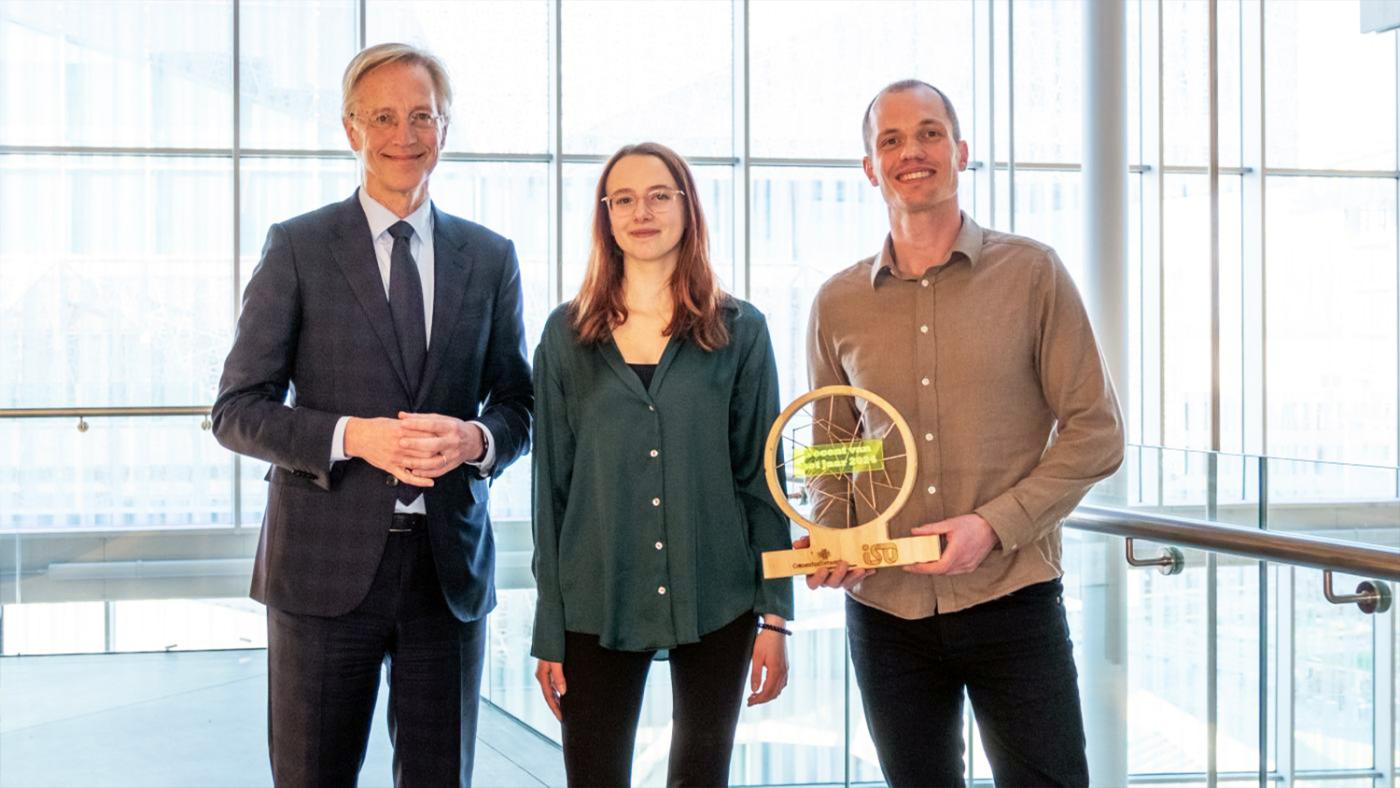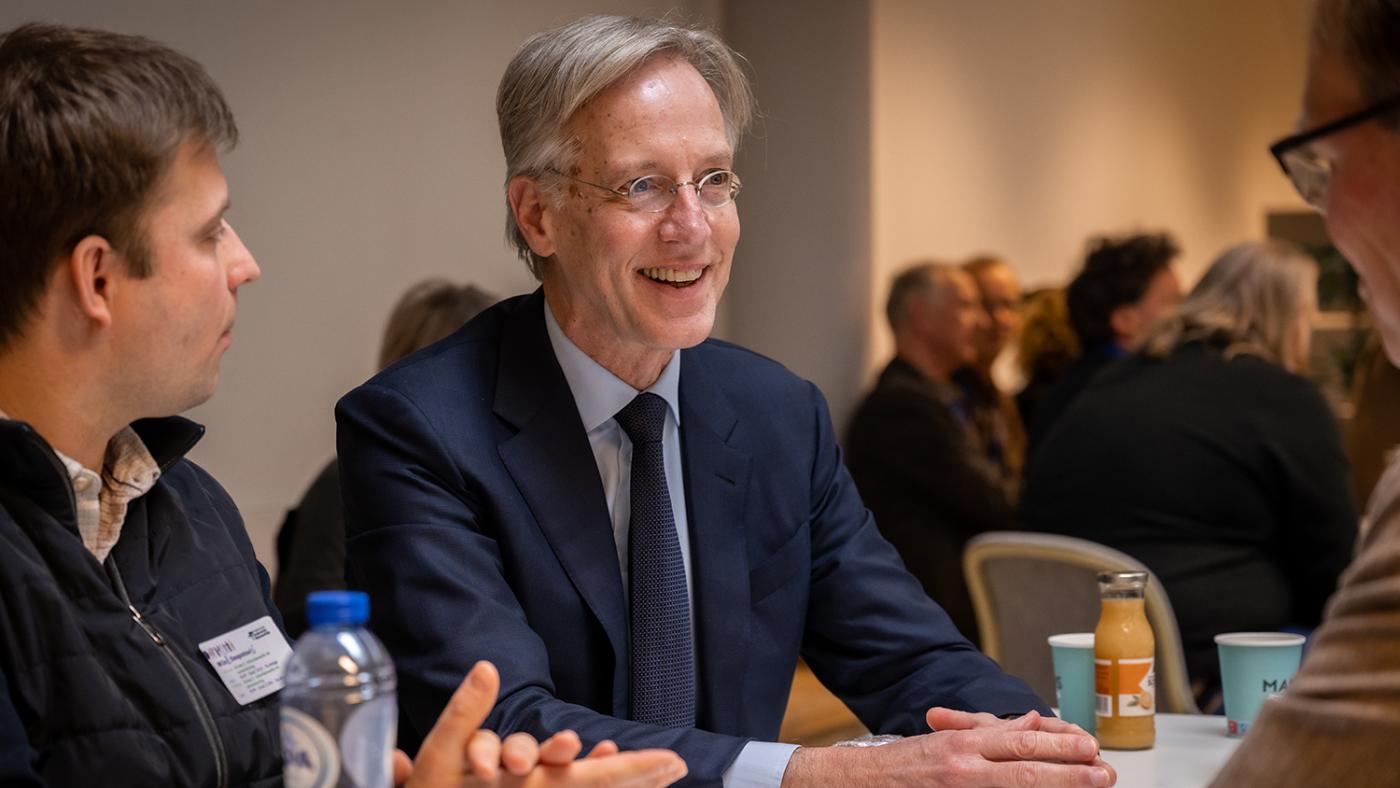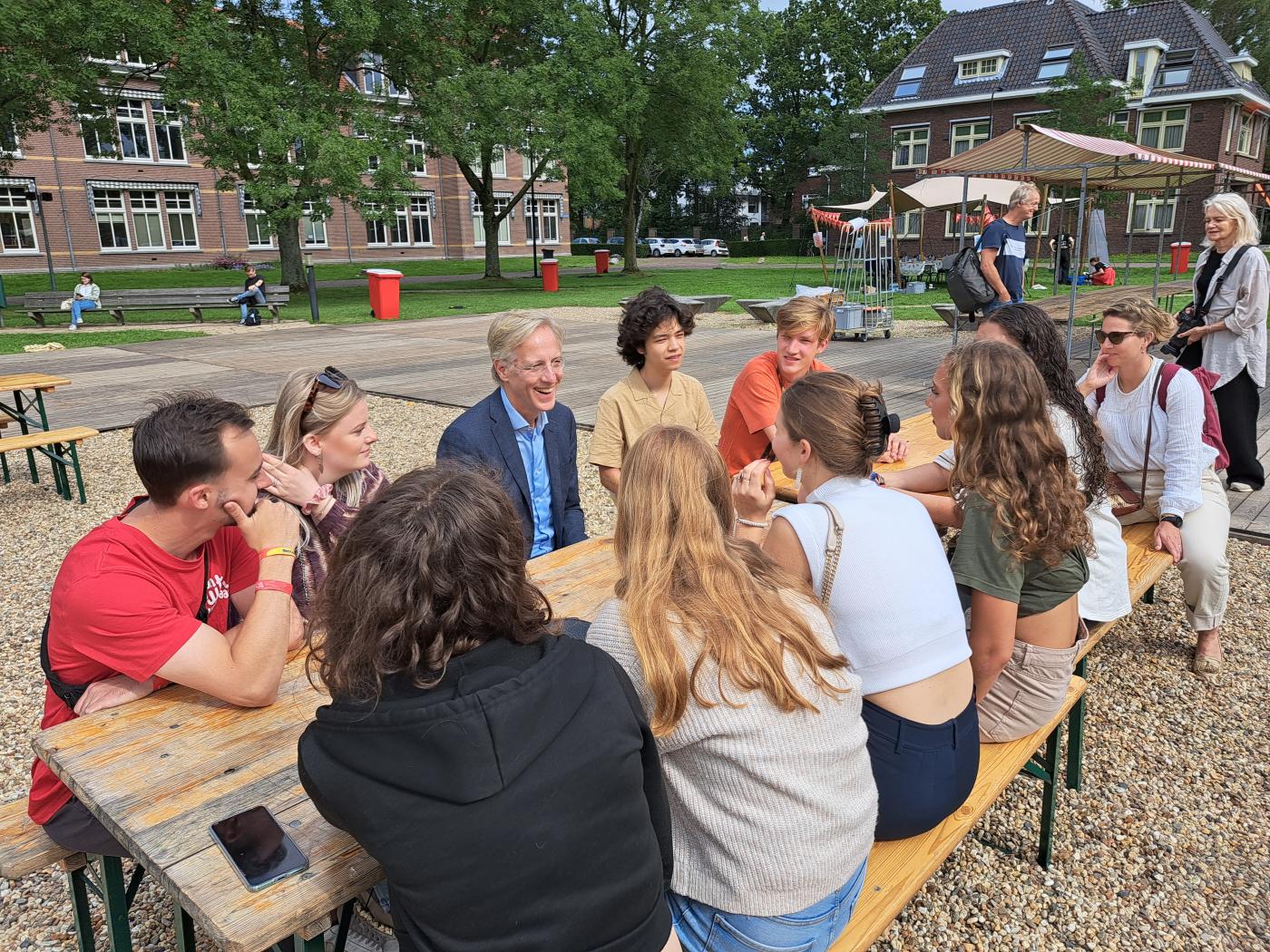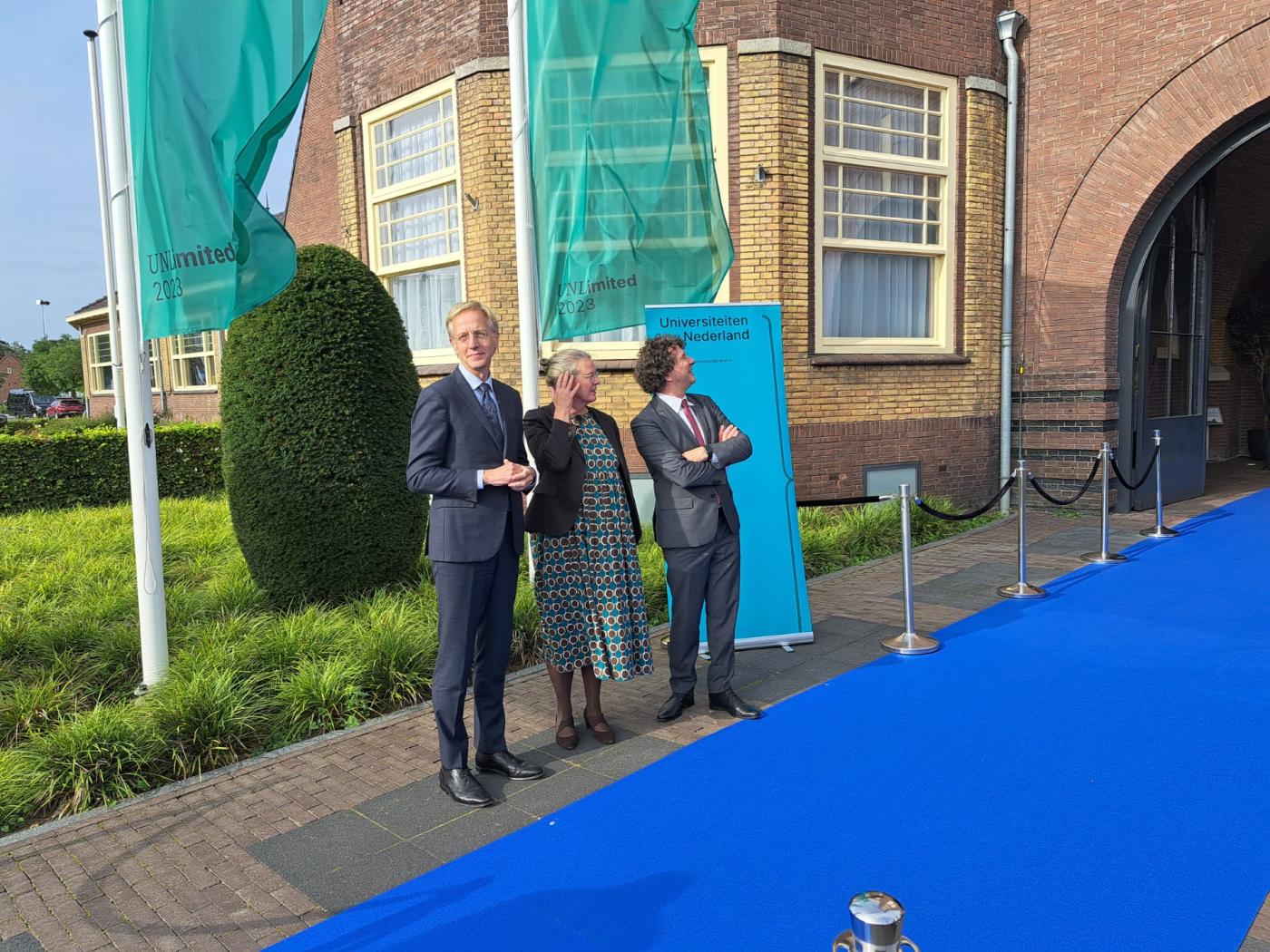A day with Robbert Dijkgraaf
'As an outgoing minister, every day is like your last day on the job'

Robbert Dijkgraaf, Minister of Education, Culture and Science, always seems to be in a good mood wherever he goes. Today he is visiting a community centre in Nieuwegein, where he will soon be presented with a report. He chats happily with administrators, students and researchers.
To look at him, you wouldn’t know that these are turbulent times; the government has collapsed, elections have been held, and no one can predict what will happen next. Dijkstra may continue to be in office for months, or it could all be over tomorrow.
How does he deal with that? What does a minister do when every day could be their last? Why did he use his official car to drive to a community centre in Nieuwegein to receive a report? And why will he be presenting an award to the Lecturer of the Year later today?
A role with gusto
We are spending the afternoon with him as he goes out on official business. It is a bit like being out and about with Father Christmas. All eyes are on him; Dijkgraaf is the guest of honour, a role he plays with gusto. He nods when someone says something meaningful and laughs when someone tells a joke.
The report being presented to him is about the role of the humanities in tackling complex social problems, which explains why Dijkgraaf had to come to this community centre. It is a place where researchers from all kinds of disciplines work with students, staff and volunteers to try to assist "in the neighbourhood."
To accompany the report, the students are invited to give a presentation about their activities. One of them discusses complex words used in healthcare that patients do not always understand. They ask the minister whether he knows what ‘aphasia’ is, for example. Dijkgraaf then listens as the student explains that it is a language disorder that can occur after a brain injury. He enjoys every moment and reflects on it as he always does – with examples from science. In the past, scientists used Greek and Latin terms among themselves, which they all understood. “But when you’re talking to patients, it’s better to use simple words.”
And then he offers a glimpse of his humorous side: politicians could do with using plain language more often too, he says.
He is a minister, handing out hundreds of millions of euros and outlining policies that will shape the course of higher education and research for years to come. But he still gives the impression of being an outsider who just happened to become a minister and is doing his job as best he can.
Dijkgraaf is also not shy about giving compliments. The cabinet is yet to give its official response, “but how can we not be enthusiastic about it now?” After the presentation of the report, he says to one of the authors: “It’s important that you all raise this issue, not me as a government minister. That would come across as patronising.”
And that seems to do the trick, because he is clearly very well-liked. There is not a single complaint or snide remark to be heard.

Robbert Dijkgraaf talks about everything during his working visits. Photo: Ministry of Education.
What is your role at events like these?
“Hmm, that’s an interesting question. Part of the role is ceremonial; the cabinet receives the report. I think that’s very important. At the same time, it’s also my role to encourage everyone here. Because as a minister, I’m actually at both the top and the bottom of the hierarchy. Because who will have to go out and do what this report recommends? The universities of applied science, the universities, the Dutch Research Council and everyone else involved.”
Responses to such reports are often along the lines of ‘good advice, we’ve been saying that for a while’. Are they actually of any use?
“These kinds of reports are important because they underscore something. This cabinet has invested substantially in applied research – 100 million euros a year. That has really been a massive step forward. We often say that science should engage more with society. Here in this community centre today, you can see what that means.”
But you already knew that.
“When it comes to education and science, most of the knowledge lies outside the ministry. The ministry does very little research, and we don’t engage in teaching. So you have to listen very carefully to the sector. The beauty of being a minister is that you hover over that landscape like a bird. You can start to see a bigger picture, above the divisions and portfolios. So it’s nice when a report like this draws a line that I also see.”
You are an outgoing minister, and it is already the end of March. Did you think the formation of the new cabinet would take this long?
“Honestly? I did. The elections were at the end of November, so there was never going to be a new cabinet before Christmas. So I suspected that we would get to where we are now. I started pencilling things in my diary again for March and April.”
How did things change for you?
“I never really had the feeling that I was on my way out. I even found it quite liberating.” This is a reference to the room for manoeuvre that has been created compared to the coalition agreement. He had previously described the fall of the cabinet as a defeat. “We were very fortunate that we were able to push quite a few things through before the cabinet collapsed. The extra money for education and research, the basic student grant... Some major steps had already been taken before the 1st of July last year. I felt as though I had just potted the plants in the garden and now I had to take good care of them for a while.”
Will the next cabinet do that?
“That’s the biggest concern, of course. We don’t know yet, but every day that the plants are watered and left to grow in peace is one more day. Someone said that when you’re an outgoing minister, you treat every day as if it were your last day on the job. That gives you focus.”
And on that "last day" as a minister, you are receiving a report and presenting an award to the Lecturer of the Year. Why is that?
“In this phase, you also try to pass on your ideas – not just to your successor, but also to the sector. Take the equality of all forms of education, for example. I try to push that whenever I get the chance. You do that just by being there.”
Discrimination
Dijkgraaf seems so calm and laid-back that you could be forgiven for forgetting the issues at stake. But when you ask him about equal opportunities and discrimination, he suddenly becomes a little more alert. It is clearly something he cares about, but it is also a politically risky topic.
As it is one that his own ministry has had to address: he issued an apology on behalf of the cabinet for student finance agency DUO’s indirect discrimination in tackling abuse of the basic grant for students living away from home. Fraud inspectors mainly targeted students with a migration background.
Do you think that issues such as equal opportunities and discrimination are in safe hands with the next cabinet?
“I don’t know what the next cabinet will look like, and I won’t comment on that, but I have learnt a few things about equal opportunities. We often talk about the ‘fan of education’ and the differences between vocational colleges, universities of applied sciences and research universities, but that’s not the only thing that matters. If you look more closely, you can also see huge differences between programmes. And no two teachers are alike; one might be concerned about equal opportunities, the other might not see it as much of a problem, and so on.”
What do you mean by that?
“That as a ministry you have to pay attention. We often talk to umbrella organisations, who then talk to administrators, who then talk to the departments running study programmes... You have to go through five or six layers to get to the teachers and the students, and yet this is a key component of equal opportunities – how does that work for the individual student? Reduced opportunities start to add up; you come from a migrant background, your parents don’t speak Dutch, and you have to make ends meet. To help these students, we simply have to go the extra mile.”
“Equal opportunities is not about saying the door is open. If you are at a disadvantage, sometimes you don’t even reach the door. There are barriers in the way, and someone has to help you cross them. That requires targeted policies, and yes, it’s a huge task. Everyone has the best intentions, even politicians and government ministries. But in the end, we depend on teachers and staff who say: ‘I’m going to make a difference’.”

Robbert Dijkgraaf talked to a group at UIT. Photo: DUB
But some people really do depend on you. You have apologised for the indirect discrimination, but you are still not demanding that DUO come up with harder evidence from now on before the basic student grant is reclaimed.
“It’s a very painful process, we’ve gone through a lot of red lights. The selection of students for the home checks was based on preconceptions. But we are serious about redesigning the checks and we are taking this on board.”
In court, DUO just needs to have a reasonable suspicion but the student needs hard evidence to refute that suspicion. That hardly seems fair. Why don’t you change that before PVV comes to power?
“The process is ongoing and there are good safeguards in place. There have been questions in the House of Representatives, but I have the feeling that there is widespread support for taking the next steps.”
A single party acting on its own wouldn’t be able to block this, would it?
“No, I don’t think so. Who would be against making the system fairer? My first debate was on the legal status of vocational students, and that proposal was passed unanimously. Sometimes parties say you have to take stronger action, others say you’re moving too fast. But the point is that things are moving forward. Just this morning I discussed this issue with the new State Committee against Racism and Discrimination.”
Choices
The minister now has to move on to the next event, the award ceremony – and we are allowed to ride along. In the back of the official car, he tells us something that goes some way to explaining his imperturbability.
“No one in my family had ever been to university”, says Dijkgraaf. “I had no idea what a university was like, but I had a picture of it in my head. To be honest, it wasn’t a picture of a campus full of new concrete buildings. And then twenty years later, walking around Princeton with its trees and towers, I thought to myself: this is exactly how I imagined it. I told this story to a young researcher this morning who is writing a book about making choices in your scientific career."
What advice did you give this researcher about making choices?
“My message was that you have an internal compass that points you in a direction: this is what I want to be, this is the area I want to be involved in. The destination might be very far away. The other thing is that you have to be in the here and now. For me, the realisation that I shouldn’t overthink what I was going to be doing next year or the year after was a real revelation in my scientific research.”
And does the same advice apply to being a minister?
“Absolutely. There are big policy goals far off in the distance, but you also have to enjoy what you can do today. The space between the two is dangerous because that’s where the things are that you can’t really get a handle on but that can be easy to worry about. I think that’s where a lot of stress comes from. Stress isn’t beyond the horizon, nor is it in the here and now, it is found somewhere in between.”
Were you able to do that as a young scientist?
“When I was 30, I was working at Princeton and I thought: this is it. In retrospect, I have never again had that same level of focus, with such complete tunnel vision. You do things that go beyond yourself. For example, you discover a formula and it continues to be true, even a hundred years from now, even if nobody is interested in it anymore. That was just amazing.”
So why did you stop?
“At some point, you start doing other things, and then one thing leads to another.”
When you became a minister, you said that sometimes – as in science – you have to wipe the slate clean and ask yourself: what are we doing? Did you have plenty of opportunities to do that?
“No, too few. But I did do it a few times and still think it’s a good idea. Legislation and policy are quite complicated. Everything takes a very long time and moves very slowly. It’s fine to take a few more weeks, but add them on at the beginning.”
Why were you unable to do that more often?
“As a minister, you’re handed all these books, so to speak, and we’re already in chapter seven, or if you’re lucky in chapter three, but we’re never at the beginning of the story. Things have already been done, policies are already in place, there’s already a coalition agreement or whatever. Sometimes it’s difficult to explain these policies. When researchers write a scientific article and explain what they are doing, my first question is always: why are you doing this? What is the question we are actually answering? That’s what you want to hear first. That’s difficult to do with policy, and ministries aren’t used to thinking in that way.”

Robbert Dijkgraaf at UNL festival. Photo: DUB
One of the main criticisms of your internationalisation policy is that it is taking so long. It’s a criticism you hear a lot. Is that because you wiped the slate clean?
“There was already a bill before the Senate, the Language and Accessibility Bill, which is why I didn’t let it proceed. I wanted to know which problem we were trying to solve. What do we think about internationalisation, other than calling for ‘more instruments’ and ‘fewer students’? I didn’t get a good answer to those questions, so I said: ‘I'm sorry, I need more time to think about this.’ What are our goals, what are our resources, and how do we want to structure it? Analysing everything carefully, step by step, takes time, but that’s exactly what we did. That was crucial.”
During the budget debate, the VVD tabled an amendment to allow a student quota for English-taught tracks. Did you think that was too hasty?
“With the ‘Internationalisering in Balans’ Act (Internationalisation in Equilibrium), we are looking for nuance, so it will take a bit more time. I often compare education policy to open-heart surgery: it has to keep beating. You can’t just switch internationalisation off for three years and then turn it back on again and hope that everything still works. It’s a hotly debated topic, also in the press, and there are lots of different opinions out there, which is good because it means we can move beyond the clichés. Let’s just not make the mistake of directly relating internationalisation to the migration debate because they are totally different things. But we do have to address issues like funding and capacity.”
Champagne
The driver parks the car at the back of a theatre, where the president of the Dutch National Students’ Association (ISO), Demi Janssen, greets the minister. He effortlessly switches to small talk. They share a memory of an ISO dinner where the minister was invited to uncork a bottle of champagne with a sword. “The whole bottle exploded”, laughs Dijkgraaf.
In the theatre hall, the event for the Lecturer of the Year award is in full swing. Three of the four candidates have already delivered a short lecture; the fourth is in the middle of giving theirs when the minister enters and takes a seat in the front row.
The host asks him questions, of course, and he plays the very role he described earlier: he encourages people. “Teaching is the thing I have missed most while being a minister”, he says. “It gives you so much. You learn the most from your students.” As he speaks his words they do not sound hollow, but in a room full of students and lecturers they were bound to go down well.
The same goes for his comments on educational innovation. Dijkgraaf: “Education is about learning and exploring new things, but the education sector itself is not the most innovative. You could take someone from the Middle Ages into a lecture hall and they would still recognise the structure. We are quite conservative, so talking about this topic at all and having ideas about it is very important to me.” A big round of applause follows.
Photo break
Dijkgraaf then presents the award and poses for a photo with the winner. Many students and lecturers come up to talk to him, and he seems to charm them all. During the drinks reception, one former Lecturer of the Year sighs to another former recipient: “It’s a shame he’s stepping down.”
This year’s winner also welcomes the fact that Dijkgraaf is at the ceremony. “I can imagine that he’s very popular as a minister, just because of who he is”, he says. “He has a certain charisma, he’s good with words. And he’s intelligent. After all, theoretical physics is something we don’t understand.”
Dijkgraaf likes to put this into perspective. He believes that the reverence lies not so much in the individual as in the position of minister itself. “People sometimes ask me whether they should say ‘je’ or ‘u’ [informal and formal pronouns in Dutch]”, he says. “So I ask them to try using ‘je’. They simply won’t be able to. You address the office as ‘u’. The office is much bigger than me.”
He doesn’t stay for long after the presentation. He could stay and talk for hours – or at least that is the impression he gives – but his spokesperson whisks him away. He has to make his way to the next meeting. Dijkgraaf walks away briskly as if nothing in the world could tire him out.
Personalia Robbert Dijkgraaf
- Geboren in Ridderkerk, 24 januari 1960
- Getrouwd met Pia de Jong, drie kinderen
Opleiding
- PhD Universiteit Utrecht (1989)
- MSc. Theoretische Fysica, Universiteit Utrecht (1986)
- Gerrit Rietveld Academie, Amsterdam (schilderen) (1982-1984)
- BSc. Natuurkunde, Universiteit Utrecht (1982)
Functies
- Minister van Onderwijs, Cultuur en Wetenschap (10-01-2022- …)
- Directeur Institute for Advanced Study, Princeton, en Leon Levy Professor (2012-2021)
- Universiteitshoogleraar, Universiteit van Amsterdam (2005-2022)
- President Koninklijke Nederlandse Akademie van Wetenschappen (2008-2012)
- Bestuurslid stichting Folia Civitatis (2007-2012)
- Hoogleraar mathematische fysica, Universiteit van Amsterdam (1992-2004)
- Long-term Member, School of Natural Sciences, Institute for Advanced Study, Princeton (1991-1992)
- Research Associate, Physics Department, Princeton University (1989-1991)